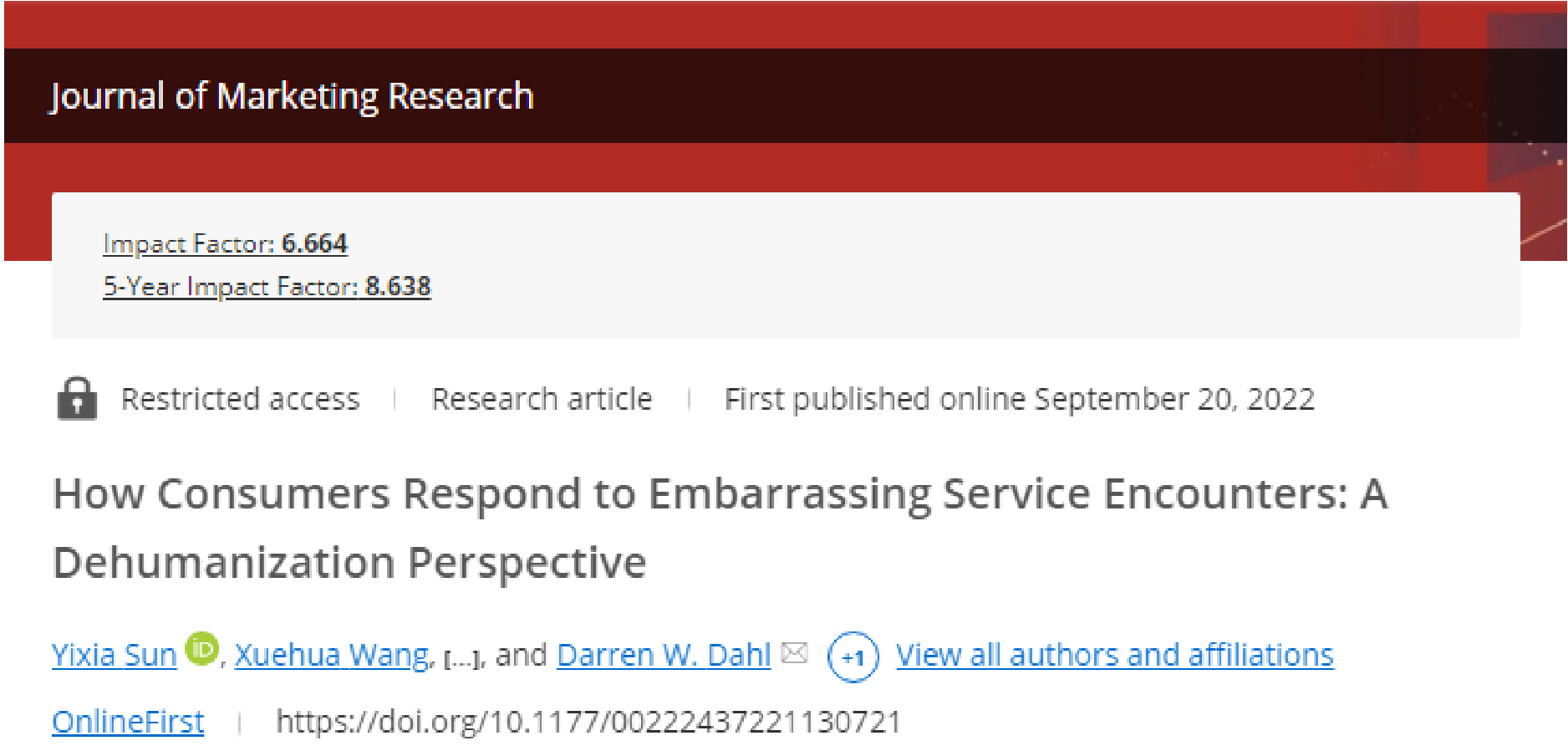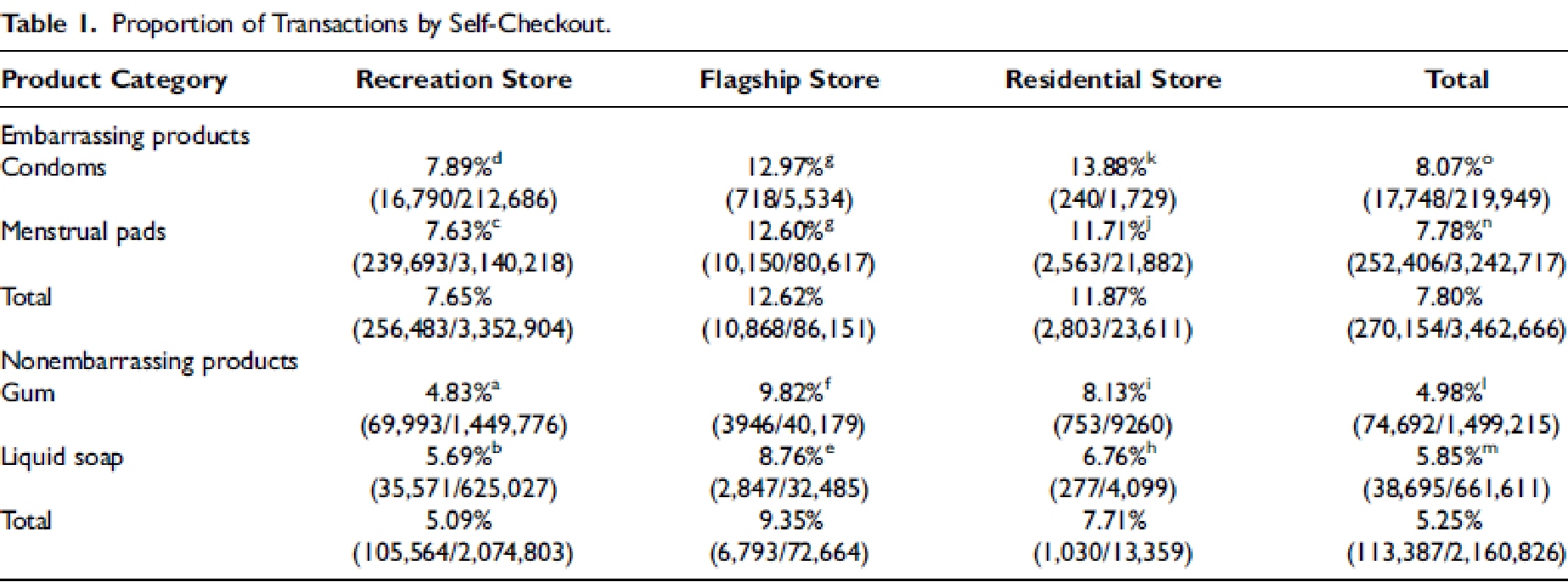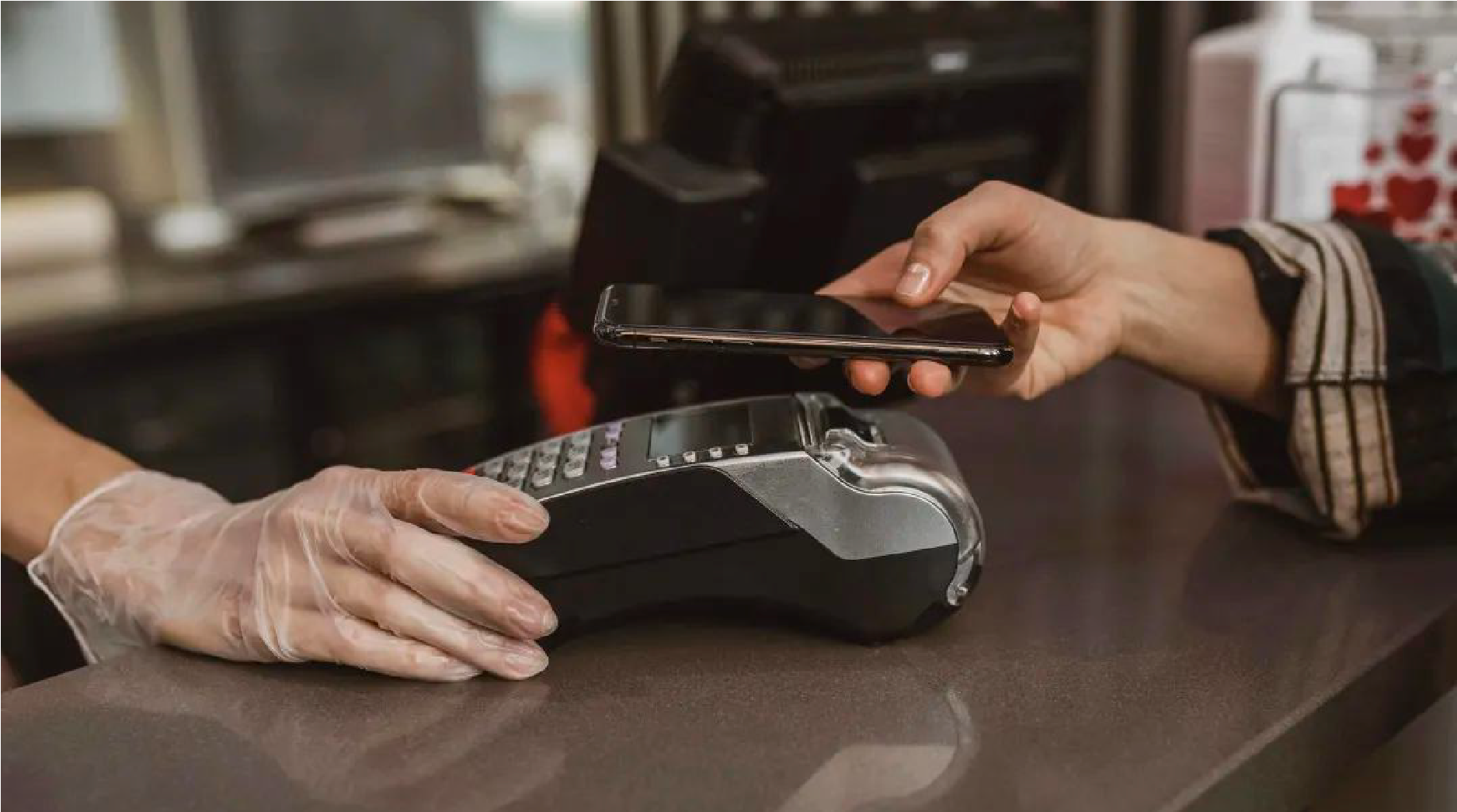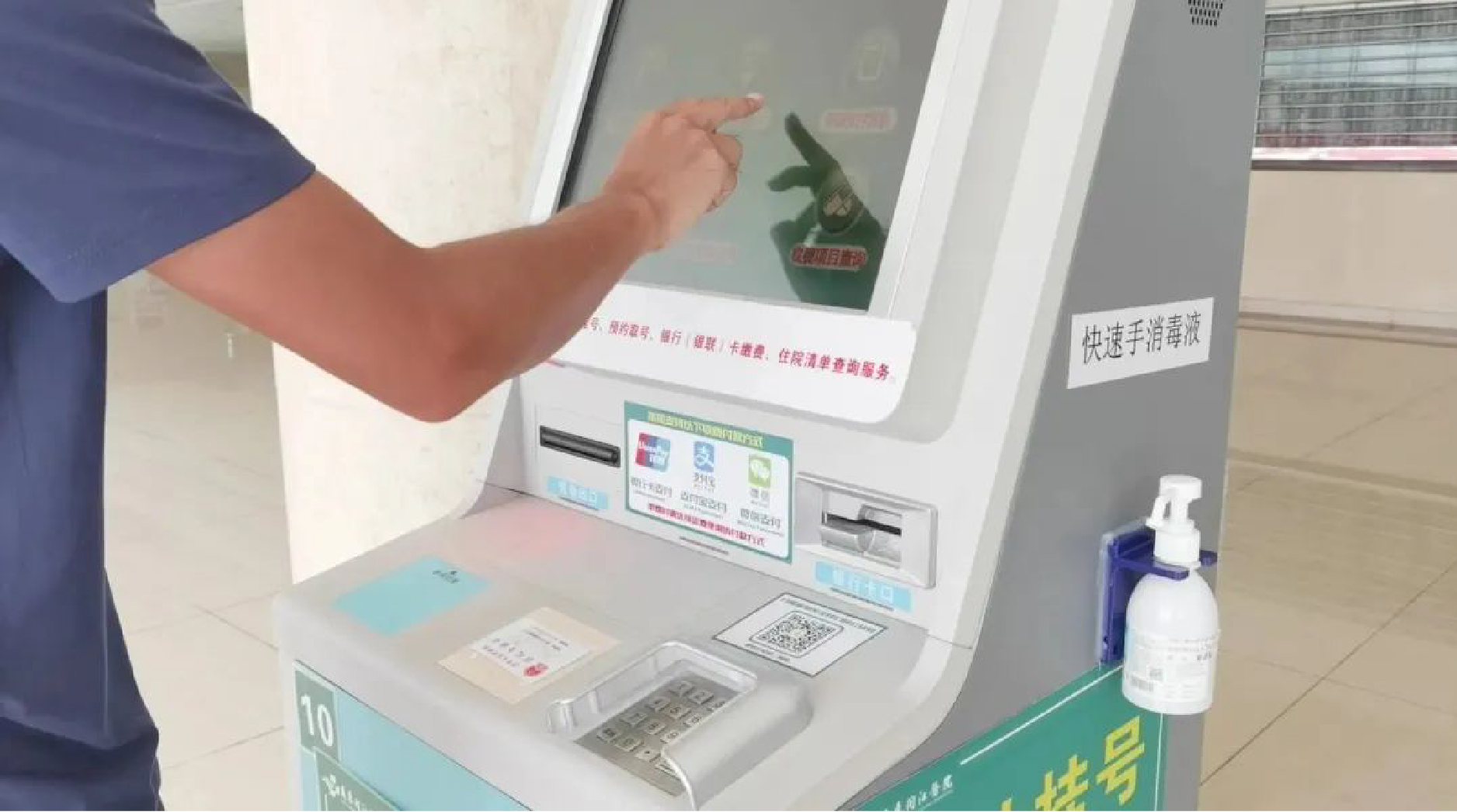
|
■ |
Have you ever experienced these uncomfortable situations while shopping? |
Perhaps you just want to browse, but a friendly shopping guide keeps introducing products to you. Or maybe you want to choose and buy private products on your own, but the guide is always hovering around, unwilling to leave. Alternatively, you may have embarrassing stains on your clothes, but the laundry clerk keeps telling you how they got there. Many people have encountered such situations while shopping, and the personable service provider has become a burden on consumers. As a result, more people prefer indifferent customer services under these circumstances.

|
©千库网 | Qianku Network |
SUN Yixia, a professor in the Department of Marketing at the School of Management Zhejiang University, recognized the prevalence of these daily consumption embarrassments and conducted extensive research on the topic.
Recently, she published her research findings in the Journal of Marketing Research (one of the UTD24 journals), titled "How Consumers Respond to Embarrassing Service Encounters: A Dehumanization Perspective."
In her study, she focused on embarrassing consumption encounters and examined the strategies consumers use to cope with their embarrassment. Her research provides valuable insights for upgrading and optimizing management in the consumption field.

|
You can access the original research paper here |
|
SUN Yixia | 孙怡夏 School of Management, Zhejiang University |
||
|
|
||
|
|
|
About the Scholar: Teacher, Tenured Associate Professor and Doctoral Supervisor of the Department of Marketing, School of Management Zhejiang University. Her research directions include marketing, consumer behavior, consumer information processing, etc. You can learn more about Prof. SUN Yixia’s academic background here |
|
She Discovered that Consumers Tend to Employ the Following Strategies When Facing Embarrassment |
Under normal circumstances, customers generally prefer personable shopping guides or service providers, and previous research on customer relationships has encouraged sales personnel to establish closer relationships with consumers. However, SUN Yixia’s research suggests that in embarrassing consumption scenarios, overenthusiastic behavior by sales personnel can actually decrease consumer satisfaction.

|
©千库网 | Qianku Network |
What strategies do consumers employ to cope with these embarrassing shopping encounters?
Strategy I: Some consumers prefer buying embarrassing products in less crowded environments. (Brackett 2004; Song, Huang, and Li 2017).
Strategy II: During the embarrassing shopping process, some consumers opt to buy additional non-embarrassing items to shift the attention of others away from the embarrassing purchase (Blair and Roese 2013; Lewittes and Simmons 1975).
Numerous studies on "embarrassing feelings" have demonstrated that these behaviors and strategies can effectively help many consumers alleviate their feeling of embarrassment. However, these strategies all involve some form of "avoidance". Professor SUN Yixia argues that previous literature has overlooked a more fundamental strategy employed by consumers to address embarrassment, namely, addressing the root cause of the embarrassment.
Previous research has shown that the root cause of consumer embarrassment does not lie in the embarrassing characteristics of the products themselves, but rather in the fact that the act of purchasing such embarrassing products is witnessed by others. In other words, consumers are more concerned about what others think of them, which then leads to feelings of embarrassment.
As a result, Professor SUN Yixia believes that there is one method that can effectively help consumers cope with feelings of embarrassment. Consumers can persuade themselves from a cognitive perspective that, in reality, others will not have more preconceived notions about their purchasing behavior, regardless of whether it is a self-deception or a fact. This strategy can help consumers address the root cause of their embarrassment and alleviate their feelings of shame or awkwardness.
|
She Proves That Personable Service May Lead to Adverse Effects, People Would Rather Prefer “Indifferent” Service |
Her research shows that consumers prefer self-service to human services when purchasing embarrassing products or services. When self-service is not available, consumers respond more positively to a mechanistic service provider than to a personable service provider.
Firstly, consumers will choose to avoid social interaction when purchasing embarrassing products.

|
Table: Proportion of Transactions by self-checkout |
SUN Yixia’s team conducted a study analyzing over 5 million transactions at a large Asian chain hypermarket from July 1, 2019 to June 30, 2020. They found that customers who purchased embarrassing products such as condoms and menstrual pads were more likely to opt for self-checkout than those who purchased non-embarrassing products such as hand sanitizer and gum (Study 1). This study provides evidence that when purchasing embarrassing products, consumers tend to prefer self-checkout options to avoid any interaction with cashiers.

|
©千库网 | Qianku Network |
Secondly, in these contexts, consumers respond more positively to mechanistic service providers than to a personable service provider when self-service is not available.
SUN Yixia’s team utilized the online booking scenario research method and used a dry-cleaning service as the case study. The team presented a group of consumers with a set of customer reviews for two dry cleaners that controlled for the efficiency and competency of the service but varied the characteristics of the front desk person. They then tested which type of service (personable or mechanistic) consumers would choose when presented with two types of stains (embarrassing and non-embarrassing) on their clothing.
The results indicated that different types of service presented in online reviews did affect the choices of consumers. In the embarrassing stain condition, 60.9% of consumers chose the mechanistic dry cleaner, while in the non-embarrassing stain condition, only 35.8% preferred the mechanistic dry cleaner (Study 2).

|
©千库网 | Qianku Network |
In addition, the research found that when the aforementioned conditions cannot be met, and an embarrassing interaction with a service provider is unavoidable, consumers tend to respond by engaging in mechanistic dehumanization. They start thinking of the service provider as less of a human being and more of a robot that is simply "doing the job" in a mechanistic and impersonal way.
Dehumanization refers to the psychological process of diminishing or denying the unique traits that make humans different from animals or machines. It can involve downplaying the gender or empathy of a doctor, for example. SUN Yixia’s team also conducted experiments to test the impact of different service styles on consumer satisfaction. The results showed that during embarrassing consumption, consumers’ satisfaction with self-service, mechanistic service, and personable service decreased in that order (Study 3).
However, there are some boundary conditions for this phenomenon. For instance, as familiarity between consumers and service personnel increases, the degree of dehumanization decreases. This means that consumers cannot employ dehumanization strategies to reduce embarrassment when they become more familiar with shopping guides or service providers, which may actually increase embarrassment. For example, running into an acquaintance while purchasing adult diapers.
These results indicate that personable service may increase consumers’ embarrassment and psychological burden when purchasing embarrassing products. As a result, more people prefer to abandon friendly and personable service experiences and choose self-service, robotic service, or "indifferent" service providers.

|
©千库网 | Qianku Network |
|
Her Achievements Expand the Dehumanization Theory and Affirm the Value of Self-service and Robotics |
This research on consumer embarrassment avoidance has significant practical implications for society. It provides guidance for businesses in the service industry on how to handle embarrassing situations and reduce customers’ discomfort.
By understanding the strategies that consumers use to avoid embarrassment, businesses can improve their services, such as providing self-checkout options or reducing personal interaction with customers when purchasing embarrassing products. In addition, the research suggests that businesses should be aware of the boundary conditions for dehumanization and avoid over-familiarity with customers, which may lead to increased embarrassment.
Overall, this research provides important insights into consumer behavior and offers practical solutions for businesses to improve their services and enhance customer satisfaction.
Professor SUN Yixia’s research also has important implications for social practice, particularly in the development and implementation of self-checkout and service robots. These technologies can provide a solution for consumers to avoid embarrassing encounters and maintain privacy in a variety of industries, such as retail, hospitality, and healthcare.

|
©千库网 | Qianku Network |
In particular, the research highlights the importance of privacy in the health and hygiene industry. Practitioners in this industry should be aware of the potential embarrassment that consumers may feel and take steps to protect their privacy. This may involve using technology such as self-checkout and service robots, as well as maintaining a certain level of professional distance from consumers.
Overall, Professor SUN Yixia’s research has significant practical implications for the design and implementation of consumer services in a variety of industries, emphasizing the importance of respecting consumers’ privacy and providing them with options to avoid potentially embarrassing situations.
- We are looking forward to Tenure Assoc. Prof. SUN Yixi continues the research and we also hope her findings can help sellers worldwide choose their service and how they approach customers more carefully.
- You can read the original article in Chinese here